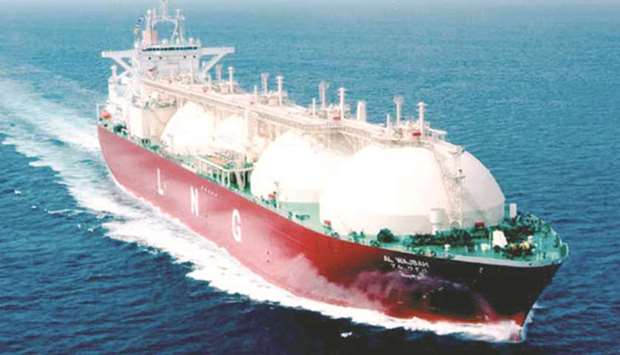European energy markets started to feel the impact of the escalating diplomatic row in the Middle East after natural gas prices soared when tankers full of Qatari fuel abruptly changed course.
Two ships bound towards Europe veered course on Thursday, taking them away from the Red Sea and Suez Canal, the transit route for gas into the Mediterranean Sea and a point of focus amid the Qatari crisis. The vessels may be sailing around Africa to Europe to avoid the Suez Canal, according to Paris-based cargo-tracking company Kpler.
European gas traders count on Qatar, the region’s biggest LNG supplier, to help refill storage sites depleted after the key winter heating season. Front-month gas in the UK jumped the most since January after the turnaround surprised traders, who had been bearish the fuel according to a survey earlier in the day, before fluctuating yesterday.
The LNG tankers, the Zarga and Al Mafyar, turned around off the coast of Yemen, according to ship-tracking data on Bloomberg. Both ships were expected to go to the UK, and sailing round the Cape of Good Hope would delay their journeys by five to 10 days, Kpler said by e-mail. The Zarga’s easterly course may be an attempt to avoid high-risk areas off Somalia, it said, anticipating arrival in the UK on July 7.
“While this would delay receipts for a couple of weeks and would lead to ripple effects felt over the remainder of June, it would have a smaller impact on price differentials and would still allow large year-on-year increases of LNG imports in Europe,” Trevor Sikorski, head of natural gas and carbon at Energy Aspects Ltd in London, said by e-mail.
If the ships stay east of Suez, that would mean more Qatari gas left in the Pacific basin, pressuring Asian LNG spot prices and supporting European hub prices, he said. More North American LNG, which this week reached northern Europe for the first time, would focus on the region as the premium global market for gas, he said.
Europe isn’t short of gas as Russia’s Gazprom is shipping winter volumes through pipelines and the heating season won’t start until October.
“Europe is well supplied by Russian gas, can pull US LNG at short notice, and there is plenty of time to replenish gas storage volumes,” said Claudio Steuer, director at SyEnergy, a Poole, UK-based consultant. “The risk of prolonged tension with Qatar is more troublesome for Europe, and the next winter.”
Qatar’s relations with its Gulf Arab neighbours Saudi Arabia, the United Arab Emirates and Bahrain deteriorated on Monday when the three countries, along with Egypt, severed diplomatic ties as well as land, sea and air travel with Qatar.
The shipping industry is likely to feel the impact of the crisis as entry bans on vessels from Qatar at some ports will force shippers to find alternative routes to refuel, potentially increasing costs and causing delays in LNG deliveries, according to FGE.
“We may start to see some inefficiencies in scheduling/routing if the issues persist,” Jamie Buckland, head of investor relations at GasLog, an LNG ship owner, said by email yesterday. “The major impact would be if the Suez Canal were closed to Qatari vessels but there is no evidence that this will happen.”
UK front-month gas on Thursday rose 4% to 37.46 pence per therm ($4.75 a million British thermal units), the biggest gain since Jan 30 on ICE Futures Europe. It fell 1.5% yesterday.
Qatar exported 30% of global LNG last year, according to the International Group of Liquefied Natural Gas Importers, known by its French acronym GIINGL. The nation is equidistant from Europe and Asia, supplying both, while the Middle East accounted for about 10% of its volumes last year, according to GIIGNL.
To get to Europe, Qatari cargoes mainly go via Suez, a faster route than around Africa. None of the 14 biggest LNG tankers, a category known as Q-maxes that includes the Zarga and Al Mafyar, have used the canal since May 26, ship-tracking data on Bloomberg show.
“Qatar shipping should retain use of the Suez Canal, which is governed by international agreements,” the Oxford Institute for Energy Studies said this week in a report. “But Egypt could reduce the canal-fee discount offered to LNG ships, making transits more expensive for Qatari LNG carriers.”
Ras Laffan LNG bonds unaffected, says S&P
Standard and Poor’s (S&P), a global credit rating agency, has said the ‘A’ ratings and stable outlooks on the $4.42bn senior secured bonds issued by Qatar’s Ras Laffan Liquefied Natural Gas Company II and III are currently “unaffected” by the diplomatic stir.
“We do not anticipate that exports of liquefied natural gas (LNG) from Qatar to major markets in Asia and Europe will be affected by the sanctions at this point, given that Qatar can access international waters via the Strait of Hormuz without crossing Saudi, Emirati, or Bahraini national waters,” S&P said.
Stressing that it would continue to monitor the situation, S&P said it may take a rating action if developments could turn “detrimental” to both companies’ ability to generate strong consolidated cash flows.
“This could occur, for example, if LNG ships have difficulty in accessing the LNG facilities or face re-fuelling restrictions, or if international counterparties to the project sever their relationships with Qatar and thereby choke the project’s revenue stream,” it added.
Recently, Washington-based the Institute of International Finance said Qatar’s fiscal balances may not be majorly impacted if the diplomatic stir and trade disruptions remain for less than a month since 80% of the government revenues came from oil and gas and dividends from state hydrocarbon companies.
Julius Baer, a Swiss private banking group, said in its research note that Qatar is a “significant” natural gas producer and a leading supplier to Asia, Europe and the neighbouring UAE, where a pipeline brings a mutual dependence framed by energy security and government revenues.
“Disruptions, especially of the seaborne shipments, are highly unlikely,” it said.
Highlighting that the muted reaction in oil markets shows that supplies from the region are unlikely to be disrupted, it said, agreeing with the oil market’s relaxed reaction to the diplomatic stir and see “no major impact on oil and gas prices.”

European gas traders count on Qatar, the region’s biggest LNG supplier, to help refill storage sites depleted after the key winter heating season.


